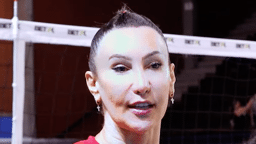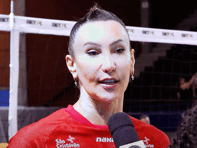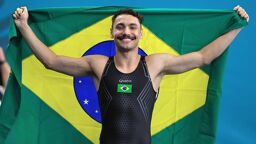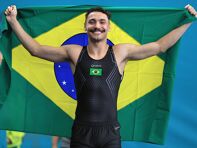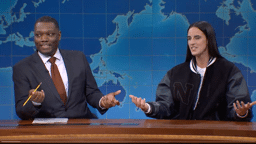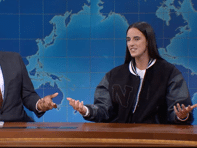Fawn Yacker is the director of The Last Closet, a campaign to end homophobia in men's pro sports.
Over 50,000 athletes have participated in the five major U.S. sports leagues since their inception. None have come out publicly while actively playing. The Last Closet is calling on members of the sports hierarchy to help bring forth a new culture in pro sports. Step one: Create viable safety nets for the gay sports heroes who will some day emerge.
The Last Closet Commissioner Campaign is in full swing and is the first of several planned campaigns designed to encourage discussion and begin action plans to combat homophobia in men’s pro sports. Prior to this current campaign, the commissioners of the five major professional sports were asked multiple times if they would be willing to be interviewed by The Last Closet, an award winning film-making team sponsored by Woman Vision. They refused or deflected each request. It became apparent that they were not ready to take the deep dive into homophobia in pro sports.
Fawn Yacker is the director of The Last Closet, a campaign to end homophobia in men's pro sports.
Over 50,000 athletes have participated in the five major U.S. sports leagues since their inception. None have come out publicly while actively playing. The Last Closet is calling on members of the sports hierarchy to help bring forth a new culture in pro sports. Step one: Create viable safety nets for the gay sports heroes who will some day emerge.
The Last Closet Commissioner Campaign is in full swing and is the first of several planned campaigns designed to encourage discussion and begin action plans to combat homophobia in men’s pro sports. Prior to this current campaign, the commissioners of the five major professional sports were asked multiple times if they would be willing to be interviewed by The Last Closet, an award winning film-making team sponsored by Woman Vision. They refused or deflected each request. It became apparent that they were not ready to take the deep dive into homophobia in pro sports.
Our straightforward request of the commissioners was/is that they answer two questions: “Would you invite your gay players to come out?” and “What safety nets would you have in place for them once they do?” We promised/promise to take only 15 minutes of their time.
Our choice to target the commissioners first, rather than say owners or general managers (both are on our schedule), is twofold. The Commissioner represents the face of his (if we are talking present time) respective league and has, as one of his primary responsibilities, the discipline of his brood. He is the one that announces and most probably decides that Amar’e Stoudemire’s homophobic tweet deserves a $50,000 fine, or that the Timbers owner Merritt Paulson’s rant at officials was worth a $25,000 fine.
The issue of discipline is an important element in designing the safety nets needed in place if we are to expect our first gay sports heroes to emerge. We would like to collaborate with the leagues to understand what those safety nets might be. In other words, what would allow a player to finally feel safe enough to come out? This conversation in the pro sports environment is essential and is still unformed.
Thankfully, some of the work has begun. The NBA’s rookie camp invited Gay and Lesbian Alliance Against Defamation (GLAAD) and Athlete Ally to present the first ever “ally training”. The National Center for Lesbian Rights (NCLR) Sports Project has worked with the 49ers front office decision makers to take proactive measures around LGBT issues. Various teams and leagues have participated in the It Gets Better Campaign and the same participation has been gaining much traction in the You Can Play Project. Each of these groups and others are working toward similar goals to encourage tolerance and equal opportunity for all.
Also, it is clear from current events that our commissioners have been supportive of some gay rights issues and have been fairly diligent about punishing players and others who spew gay slurs. Without taking a stand on the issue itself, NFL’s Roger Goodell supported Brendon Ayanbadejo’s right to defend gay marriage. Bud Selig and MLB suspended Atlanta Braves pitching coach Roger McDowell for two weeks without pay for his hideous homophobic verbal rampage at the opposing league’s fans. He also fined Yunel Escobar three games for using a gay slur. NHL commissioner Gary Bettman supports the You Can Play project, which hopes to create a supportive environment for gay players, although in his statement of support, he did not use the word “gay”. Houston Dynamo midfielder Colin Clark was suspended and fined by MLS commissioner Don Garber for using a gay slur against a ball boy and more recently MLS dropped its partnership deal with Boy Scouts of America. The leagues party line on the Boy Scout decision was that it was for “business reasons”, but prior to that decision were outcries from the LGBT community repudiating the BSA’s policy of barring membership to LGBT Americans. The NBA’s David Stern was commended by the Human Rights Commission for tackling anti-gay discrimination. Stern had fined both Kobe Bryant and Joakim Noah for using homophobic slurs on the court.
Here’s the thing though. There were two different fines imposed by Stern – Bryant $100,000 and Noah $50,000. What determined the fine amount? Is it based on income? Is it based on where and when the slur was used, or how offensive the slur was? Is the monetary fine less if the game suspension is longer? What if the slur was combined with physical violence? These are just a few of the myriad questions that will inevitably come up when setting a structure for these kinds of offenses.
Professor Eric Anderson of the University of Winchester, England, a sociologist and an expert in the field of homophobia in sports, points to the inequity of the law on the field and off. He uses an example that most of us are familiar with, but do not register as problematic because of just how familiar it is. He maintains, “Actions that elicit punitive manner off the pitch, do not do so on the pitch. If, for example, a high school math student punches another student, he receives a five-day suspension or expulsion. If, however, that same boy punches someone on the soccer pitch an hour later, as part of a school soccer program, he receives a red card.” For Professor Anderson, athletics needs to be held to the same standard as other segments of society. “School systems, businesses (of which sport is) and governments have various rules/laws about speech that is intended to degrade, inflame violence, or denigrate another. Players should fall under those rules/laws, equally, regardless of the nature of the group they incite.”
Helen Carroll, director of the Sports Project for The National Center for Lesbian Rights (NCLR) suggests that if players know the consequences BEFORE stepping out of line, they would adhere to “Think B4 You Speak” (tag borrowed from the GLSEN Sports Project and the Ad Council’s PSA about bullying). In addition, she points to team leaders who would be made responsible for controlling locker room vitriol. To effect a culture change such as she describes would take a concerted collaborative effort by the leagues and groups familiar with LGBT discrimination. Carroll is convinced this can be done. Training is the key. She hopes for a time when there are no holes in these “safety nets” through which a gay player could fall.
So back to the question at hand – Why the commissioners and why now? It is beyond reason, as reflected by the current cultural zeitgeist, to think that if we asked our two questions we would hear “NO, we don’t invite our gay players out” and “NO we will not provide safety nets for them”. There in lies the problem in obtaining these interviews. We believe the sports hierarchy, beginning with the commissioners, are not yet feeling safe enough themselves to step up to say YES, we support a gay athlete coming out and YES, we will take responsibility for their safety. We can only guess what their fears may be. Do they think that the fan base would drop away, or that corporate sponsorship would dwindle, each culminating in financial loss? In all probability, this would not happen. Are they afraid the timing isn’t right, or that they would be perceived as taking a political stance? This is not a political issue, it’s a human rights issue. If not now when? Are they waiting for yet another major US institution to declare that gay is OK? Have they not had enough time to configure their strategy and talking points on the issue? Do they feel it’s not their responsibility to do so?
We at The Last Closet contend that the time is not only right to address these issues, but waiting any longer is unconscionable. These statements of support need to be seen and heard on camera. Hearing and seeing the top officials in major professional sports speak affirmatively in support of gay athletes and sincerely addressing the issue of safety, will help to dispel the misgivings of those athletes on the fence about coming out. Our youth need this man/these men to come forward. They need gay sports heroes. The emergence of an out gay athlete could be life changing for the LGBT youth who contemplate suicide every day because of who they are. It could possibly save the lives of those 30-40% of LGBT youth that actually attempt suicide and the inordinate number who succeed.
Commissioners, the time couldn't be more right. Say YES to an interview with The Last Closet and make your league proud.














